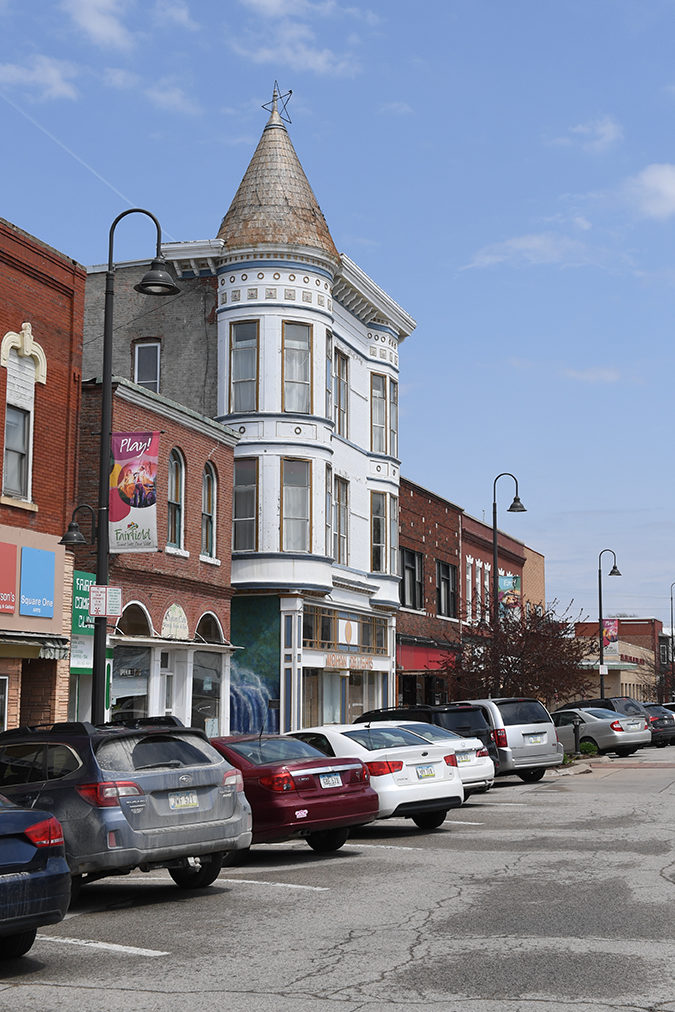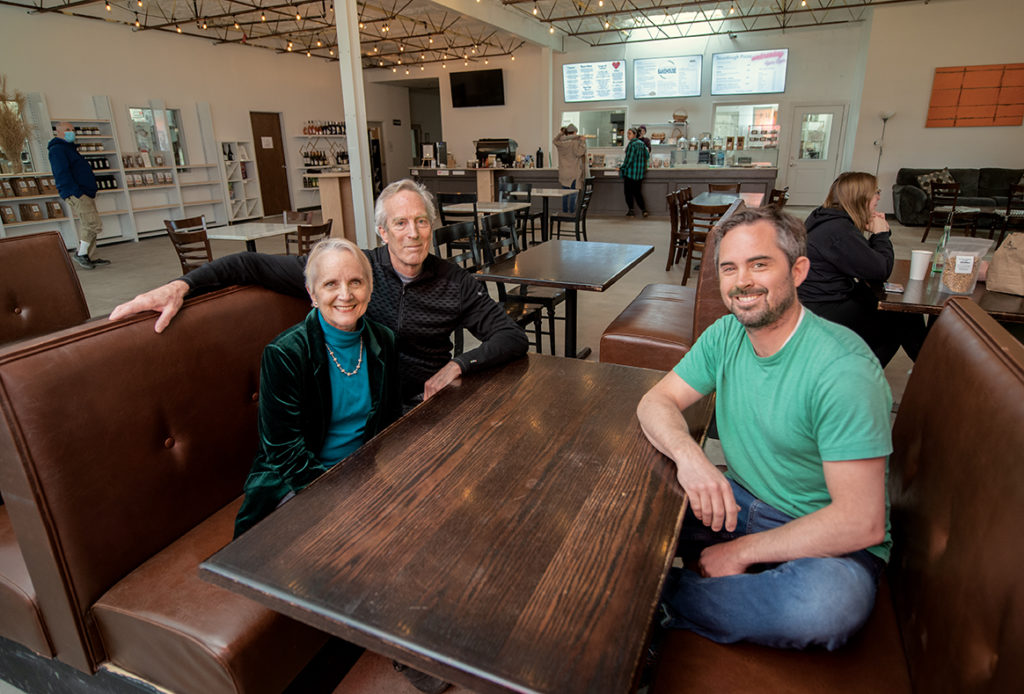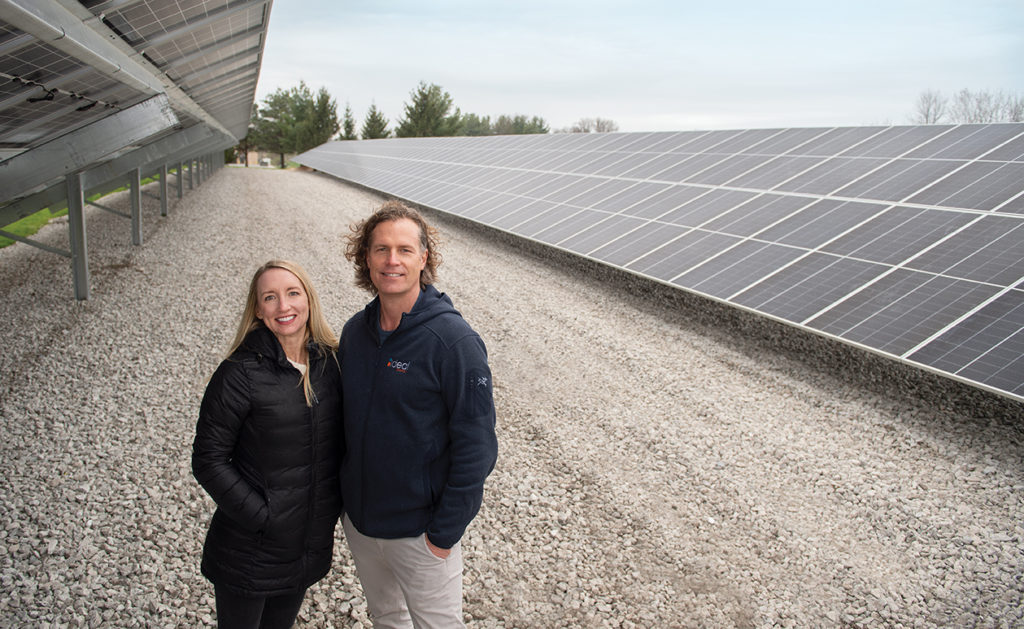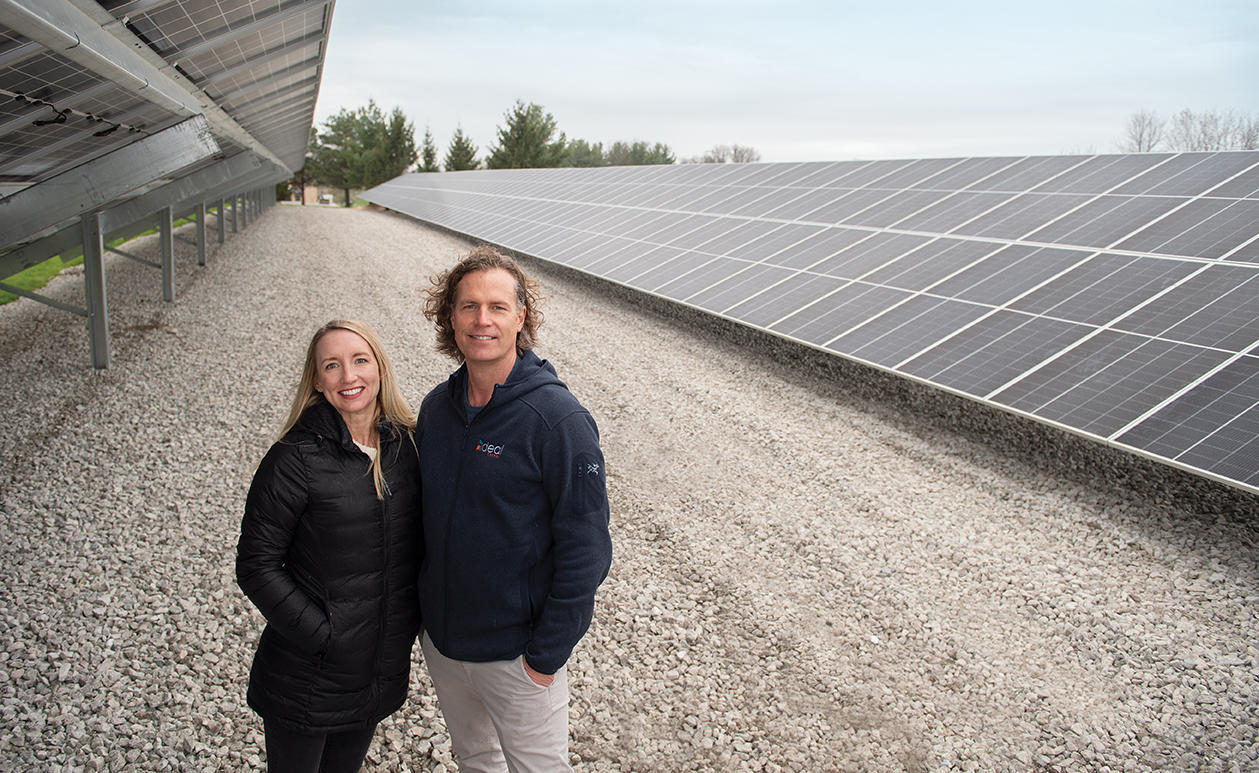How Fairfield, a rural southeast Iowa community, has spurred innovation
Fairfield, Iowa’s history is one that other Iowans may not know well.
Among its interesting facts: The Fairfield Public Library is the first prototype of the Carnegie library, of which there are now 2,700 around the world; the company that developed the international symbol that verifies which foods are free of genetically modified organisms started in Fairfield in the 1990s; and a Fairfield television production business called Hawthorne Direct produced some of the first infomercials in the country.
The community of about 9,400 people has developed a wide range of businesses from manufacturing to finance to numerous restaurants. There’s a mixture of ones that are decades in the making and ones that are earlier in their journeys.
Fairfield’s culture of entrepreneurship stretches back to its inception, but its progress in diversifying over the last 40 years can be tied to a new iteration of the community’s culture that began with an influx of people moving to the southeastern Iowa town from all over the world.

Maharishi Mahesh Yogi started Maharishi International University in Fairfield in 1971, founding it on principles inspired by the Transcendental Meditation movement and consciousness-based education, including developing the full potential of the individual and realizing the highest ideal of education.
In the summer of 1979, the founder invited 2,000 people attending a World Peace Assembly to move to Fairfield to practice meditation and build their lives. When they got there, making a living meant starting ventures of their own as the people who came then outnumbered available jobs.
Ed Malloy relocated to the city with a degree in psychology and became one of those local entrepreneurs, not knowing he would also later serve as Fairfield’s mayor from 2002 to 2020.
“People say, ‘Why Fairfield?’ and the honest answer is that Fairfield had something that attracted young, educated people who had a new necessity to find a way to make a living because of their commitment to coming here,” Malloy said.
He said there was a novelty of being around other like-minded people interested in meditation that energized the community to help one another test and develop ideas.
“There was also a camaraderie of people who enjoyed creating something new and creating a lifestyle in this place, and business became a big part of that and it really fed on itself,” he said. “There was a lot of energy coming out of the stories of success that people were having. It really helped to bolster and fuel that.”
This isn’t an uncommon cycle, Malloy added, but it is usually more typical in urban areas.
Longtime Fairfield Entrepreneurs Association President Burt Chojnowski said the community of aspiring business owners created a close network of “peer-to-peer support,” provided through feedback and new connections.
“We effectively turned our whole town into an incubator,” Chojnowski said.
The FEA was established in 1989 to more formally bring together the community’s entrepreneurs for seminars and resources, and many businesses started by the newcomers were restaurants, which were, and are, frequently patronized by other business owners for meetings and networking.
Investment in the new ventures also started from within, Malloy said. Angel investing from friends and family who liked an idea was common; then Chojnowski assisted in introducing West Coast venture capitalists to Fairfield.
Between angel investors and venture capitalists, Fairfield had attracted around $200 million in investments by 2003, when the city was recognized as the Most Entrepreneurial City in America with a population under 10,000 by the National Association of Small Towns and Townships and the Kaufman Foundation.
Chojnowski classifies the changes Fairfield underwent following the migration in the early ’80s as a “rural renaissance.” Early adoption of the internet and a long-held entrepreneurial culture have created a legacy that has supported the community into the 21st century.
The early days of the ‘renaissance’
Several companies that were young startups at the time of Fairfield’s “renaissance” helped establish and still influence the business community and economy Fairfield has today. Two of those businesses are Local Internet Service Co., or LISCO, and Cambridge Investment Research.
Meditation brought the founders of both companies to Fairfield. LISCO founder Lance Yedersberger arrived from Canada in 1976 to train and work as a meditation teacher, and started BossLogic, one of about 40 early software development companies that emerged in Fairfield by the 1990s.
In 1994 Yedersberger found himself rooted in Fairfield and looking for a new venture when a friend suggested bringing the internet to the community. He set his eyes on bringing it to all of southeast Iowa.
He built a network for dial-up internet in Fairfield in four months, which garnered interest and got LISCO its first customers. To build capital for expansion in Iowa, he sold a product he called “internet provider in a box,” which provided all the hardware to install dial-up, and he would travel to train people on how to do it.
LISCO introduced the community to the benefits of DSL internet, and by 2008 Yedersberger moved to build out fiber internet in Fairfield with the help of a $12 million loan from the U.S. Department of Agriculture’s Rural Utilities Service.
Once fiber was installed, LISCO offered speeds of up to 100 megabits per second, which was beyond what consumers would find in most large cities at the time.
LISCO was a step ahead on speed because other large telecommunications providers at the time held the technology back for strategic reasons. Yedersberger said his dedication to what it could do drove him to offer it at the fullest capacity possible.
“It just felt right from an innovation standpoint to do it that way,” he said. “Why would you want to skimp when you know you really should be fully innovating, you should be fully transforming the environment, not just skimping along?”
Having the internet infrastructure built early and being on top of the latest developments reinforced to the community that Fairfield had both the social connections and the practical resources to support businesses.
Yedersberger said both new and old meditators in Fairfield were interested in the town’s internet capabilities, especially as it became more vital to running a business and functioning in a community.
The Telecommunications Act of 1996 helped break up telecom monopolies and clear the way for small companies like LISCO, and Chojnowski said other deregulation of different markets in the 1990s was one factor that propelled Fairfield forward as national companies could now look to smaller towns as viable headquarters locations.
That was the case for Cambridge Investment Research, now Fairfield’s largest employer with about 900 employees.
Eric Schwartz, Cambridge’s founder and executive chairman, moved to Fairfield because he found a sense of community that he connected with, as well as a location for the broker-dealer and investment adviser’s administrative operations that would save the young business money.
“Although it wasn’t the primary reason that I moved to Iowa, I became aware very quickly that when you’re basically a back office, why would you be in a really expensive place to live?” Schwartz said.
Initially the challenge with the location was spending longer to fill senior positions based in Fairfield. But the other factor that Chojnowski said spurred Fairfield’s progress in the ’80s and ’90s was something Cambridge leveraged to adapt to the local hiring environment: a reliable workforce.
Cambridge hired Fairfield residents who didn’t have backgrounds in financial services for nearly all of its roles and trained them internally. While this also took additional time, the investment mattered because it helped retain employees.
“Chances are they would not move to Chicago or New York or L.A. because they got a better job,” Schwartz said. “They wanted to be in Fairfield. They grew up there or their husband grew up there. Whatever the reason is that they were in a small town, it wasn’t like they accidentally ended up in Fairfield.”
As Cambridge gained business and reputation, Schwartz said it became easier to attract talent to Fairfield. The impact of Cambridge and LISCO is visible in the attraction of related financial and technology businesses and the way technical capabilities have continued to grow.
Josh Laraby, executive director of the Fairfield Economic Development Association, said internet speeds of up to one gigabit are now available in Fairfield, a difficult find in rural areas, giving them “a strong competitive edge for supporting tech startups.”
While Yedersberger said he believes Fairfield’s early advancement in connectivity was a catalyst for furthering the town’s entrepreneurial culture, he said the “biggest catalyst” at the time was Maharishi attracting intellectual people who had diverse backgrounds and were open-minded and creative.
Laraby shared the sentiment, saying the university still tends to attract people who value autonomy and ownership of their health and life.
“I think just that character of individual being attracted to that sort of education, a lot of people’s desire for autonomy rolls over into, ‘Hey, how am I going to make my money,’ right?” he said.
Fairfield’s ecosystem also thrives because of its focus on providing an active network of support and resources that encourages confidence in pursuing a business idea, Laraby said.
In addition to the supports available to small businesses in any part of the state, an economic development initiative in Fairfield was to start the coworking space Fairfield CoLab, which has been active for about five years.
Similar to how the Fairfield Entrepreneurs Association fostered the entrepreneurial community in the ’80s, the CoLab serves as a local incubator, Laraby said, especially for solopreneurs, or one-person companies, as they get started and seek connections to people and resources. The Fairfield Economic Development Association and Indian Hills Community College were two of the partners and offer their business and financial planning services to members.
Laraby emphasized that building and maintaining the culture Fairfield has isn’t necessarily easier just because of its size.
“There might be another 10,000-person town in Iowa that isn’t seeing the same success we are,” he said. “There might be a multitude of reasons for that, but I do think the value here of entrepreneurship, and the belief that the entrepreneur’s vision could come to fruition, is the foundation, in my opinion, for why it’s successful here.”
Fostering Fairfield’s future
Fairfield’s sense of entrepreneurship among businesses bleeds into the town’s approach to community and economic development as well.
The local economy features business and industrial parks, one of which includes a new 30,000-square foot building that was an economic development initiative to help attract companies to Fairfield with move-in ready space. Iowa City-based Sun & Fun Motorsports purchased the building late last year.
The local “foodie” community contributes to making Fairfield a place to enjoy living as well as working. An eclectic selection of ethnic and health-focused restaurants draws people from neighboring communities, and Laraby said other food entrepreneurs are looking to bring products to market through retail or manufacturing.
Chojnowski said local civic entrepreneurship has helped Fairfield offer amenities its counterpart cities can’t always support.
“A couple of ladies in our town organized the Community Arts Center and our local convention center, and most communities our size don’t have facilities like that,” he said. “Most communities our size don’t have up to 1,000 people that you would consider artists [or] authors as their full-time profession.”
Laraby said with local entrepreneurial interest at a high in 2021 and 2022, the focus from the economic development perspective is helping new ventures grow.
“That’s part of what we enjoy doing in economic development is incubating these opportunities and fostering them. They could be our next big Cambridge, they could be our next big Agri-Industrial Plastics, they could be our next big Traffix Devices – all startups here right in the middle of the cornfields,” he said.
Looking at Fairfield’s potential growth through relocation or expansion, Laraby said the No. 1 consideration for companies, both before the pandemic and now, is having the necessary workforce.
Chojnowski noted how Fairfield has “more jobs than people,” but being one of the primary town centers in southeast Iowa, it draws in workers. U.S. census data from 2017 shows that more than 3,400 people who worked in Fairfield lived outside of the town.
Years have passed since the internet came to Fairfield, attracting new people and businesses, but Fairfield is working to secure its future workforce and may repeat a similar cycle with investments in two infrastructure initiatives: child care and affordable housing.
Laraby said rural areas in Iowa and beyond “have to work twice as hard,” and he sees that as an opportunity to become more committed to the community and ensuring it thrives.
The child care strategic plan started about four years ago with improvements for existing child care providers and facilities. But still seeing a need for more availability, Fairfield broke ground on a new child care center in early 2022.
“Seventy percent of the project has been privately funded by our employers because they see not only the opportunity to give back to their community, but mainly an investment to hopefully be able to help them attract and retain talent by having the infrastructure in our community,” Laraby said.
The next entrepreneurial era
Entrepreneurially, Fairfield has grown into a new and still emerging era while maintaining the influence and values of the residents who arrived about 40 years ago and the unique ecosystem they helped develop.
Yedersberger said after 37 years living and working in Fairfield he sees a “mature” community as it achieves a mix of established and new businesses.
Chojnowski’s read is that in the last five to 10 years the entrepreneurial growth has been among microenterprises, startups that often have fewer than 10 employees and usually don’t need venture capital to get started.
New data on microbusinesses from Venture Forward, an initiative of web hosting company GoDaddy, supports that perspective.
Started in 2018, Venture Forward combines its internal data on the microbusinesses that use GoDaddy for their website with data from other sources, including the U.S. Census Bureau and Bureau of Labor Statistics.
In the last quarter of 2019, the microbusiness density in Jefferson County was 35.6 microbusinesses per 100 people. Of the 10 Midwestern cities of similar size that had the highest microbusiness densities that quarter, Jefferson County’s was No. 1, sitting two to four times higher than the others.
By the end of 2021 the microbusiness density grew to 40.3 microbusinesses per 100 people, for a total of more than 6,100 microbusinesses in the county.
While batches of new microbusinesses have launched in Fairfield more recently, some, like Breadtopia, have been present in Fairfield for years.

The business started in 2006 with founder Eric Rusch putting instructional videos on how to make bread on YouTube and has evolved to offering the bread-baking community guidance and recipes, a public forum for advice and conversation, and an online store with baking hardware, supplies and 87 options of whole grains and flours, which are made on-site with their commercial stone mill.
“It’s been a slow, gradual growth since day one, but it’s been a growth every year,” Rusch said.
He and his wife, Denyce, settled in Fairfield by the early 1980s, moving from the West Coast, influenced by meditation. Both had or found interest in different sides of baking.
Being an online business, Breadtopia has had a wide reach, primarily beyond Fairfield. But in moving into a new 40,000-square-foot space about two years ago, the extra space supported new opportunities to look local.
The commercial kitchens in the building are used for a new bakery, Breadtopia Bakehouse, and a new spinoff business spearheaded by Denyce and Galen Saturley, her son and operations manager for Breadtopia.
Fairfield Food Collective, the brainchild of Saturley, allows aspiring restaurant owners and the town’s food entrepreneurs to rent kitchen space, serve their food in the cafe, similar to a food court, and develop food products to be distributed in stores and co-ops, Denyce said.
They plan to build more local connections by designating some space for both Breadtopia and other groups to host classes and do video production as well as seeking to host baking conferences in partnership with the convention center.
“Eric has baked [bread] at home and teaches people how to bake it at home, and that’s inspiring, but at the same time all our friends go, ‘Well, where do I get it?’ It’s been a fulfillment of a desire to give what we love to our community,” Denyce said.
Synergies between community and business like the ones Breadtopia is building have been inherent in Fairfield throughout its history.
Maharishi inspired a focus on sustainability where local leaders and business owners all take part. Breadtopia is working on adding a certified organic grain mill to its operations and had solar panels installed by another Fairfield company, Ideal Energy.
Amy Van Beek, a Fairfield native who boomeranged back after college, and her husband, Troy, own the solar energy business, one of the first in Iowa. They founded it in 2009, inspired by Troy’s experience as a U.S. Navy SEAL, seeing alternative energy as a way to improve global security.
Ideal Energy differentiates itself by developing solar energy products for manufacturers and industrial operations, where solar energy is difficult to implement, but being a community of entrepreneurs and one supportive of sustainability has kept the company based in Fairfield.

The company only did projects in Fairfield its first year, with the city’s efforts creating an awareness that uplifted Ideal Energy’s mission. In that time Van Beek said they found several local businesses with commitments to investing based on what was most sustainable, not what offered the best return on investment.
“I think Fairfield was very pioneering in that time frame,” she said. “What we were doing with having a sustainability coordinator in the city and really pushing for citywide sustainability and renewables. There were a lot of businesses in Fairfield that were thinking ahead of the rest of the state.”
Ideal Energy continues to work locally, including on new projects with Fairfield manufacturers, and recently started its own apprenticeship program when faced with a need for electricians.
Whatever the business or the idea, Fairfield encompasses entrepreneurship in traditional and new ways that are set to dispel misconceptions of what is possible in small and rural towns.
“I think Fairfield is a little more unique than other communities because I think it would be hard to just set up shop anywhere in any town of 10,000 and have the kind of success that we have,” Van Beek said. “We were able to grow the way that we have because there was a real demand for what we were doing in the community.”
